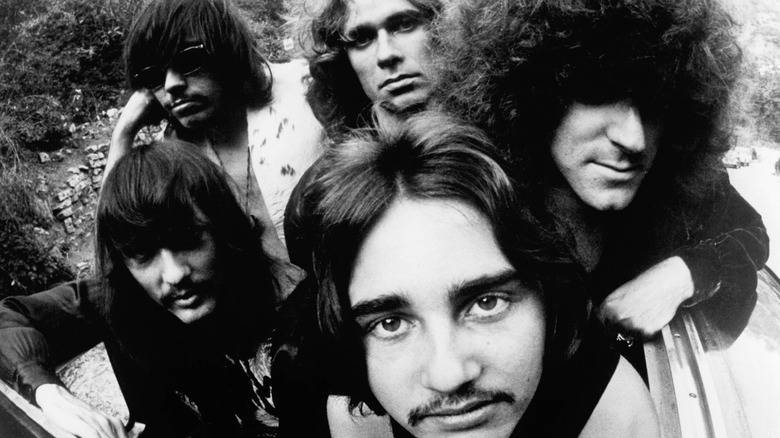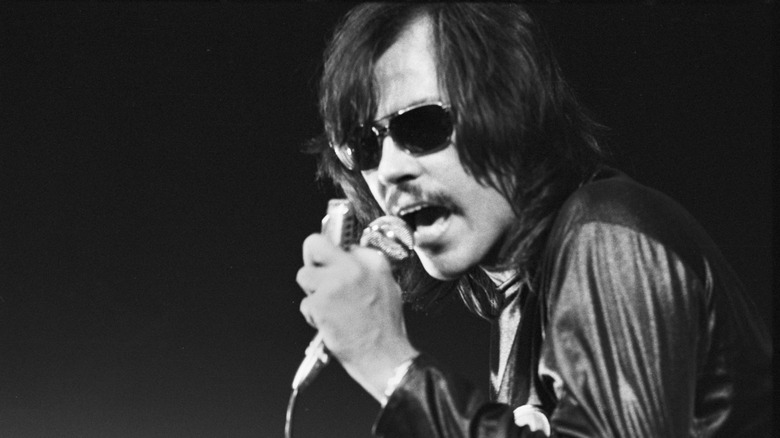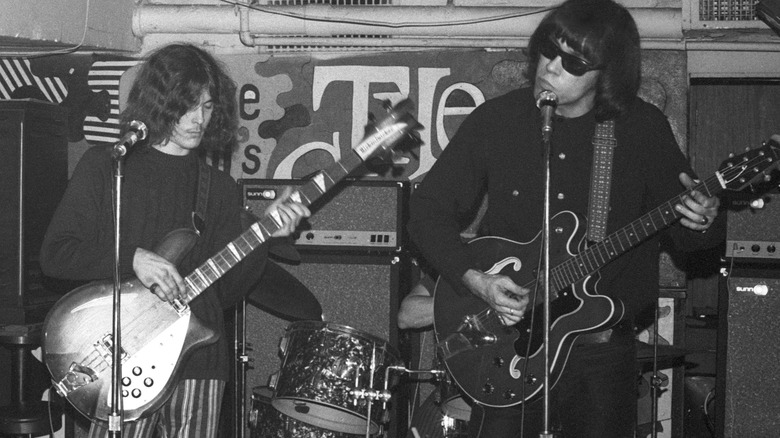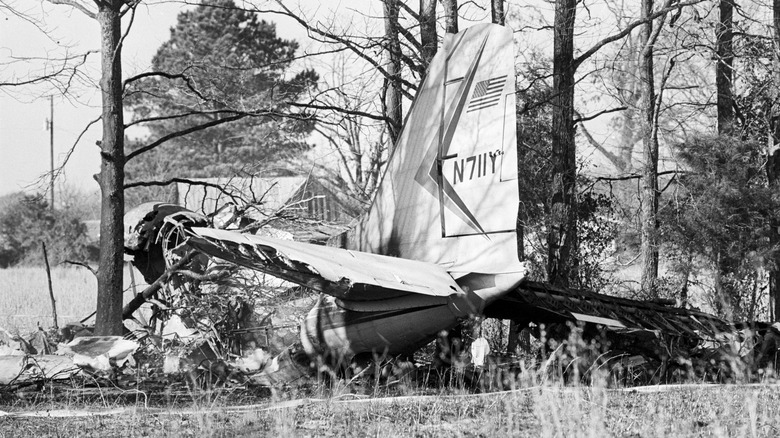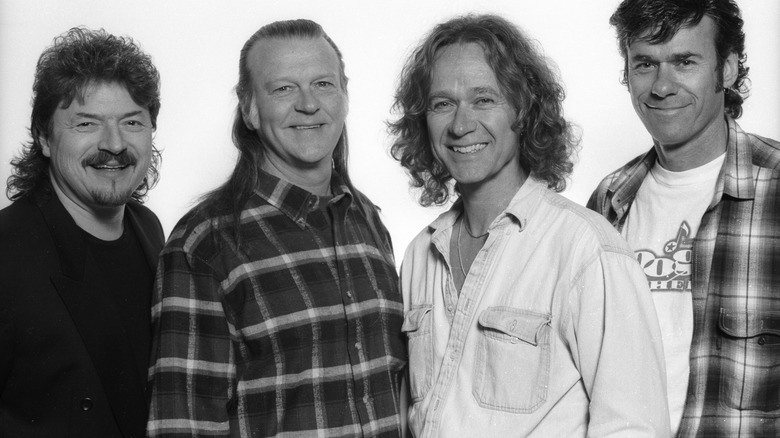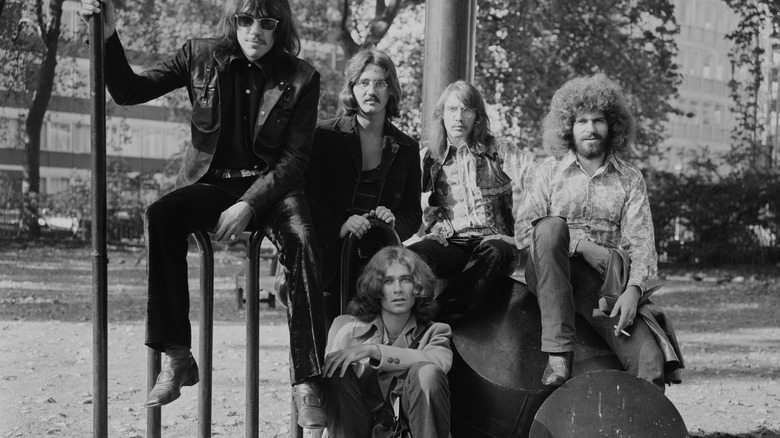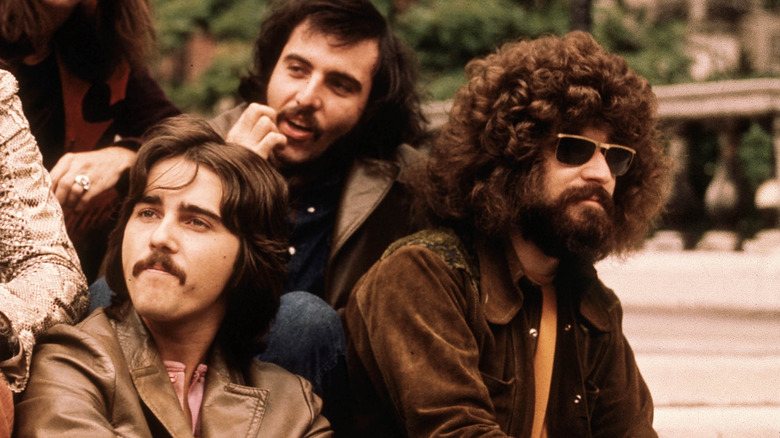Tragic Details About Steppenwolf
If there's any band that's guaranteed a spot on the soundtrack of America's 1960s and '70s counterculture movement, it's Steppenwolf. They were, after all, "Born to be Wild," and is there anything more that needs to be said?
Not really. (But there is ... because who can forget "Magic Carpet Ride," especially when talking about the songs that are guaranteed to get even the most reserved person dancing.) Steppenwolf's counterculture, fringe roots are actually right in their name — although it takes a little bit of a deep dive into German literature. The band shares their name with a German novel written by Hermann Hesse, published in 1927, and suggested as a band name about four decades later. To say that it's pretty dark stuff is an understatement: Both Hesse and his novel's main character, Harry Haller, had a lot in common. They had turned their back on family and traditional ideas of home, they were struggling with depression and suicidal thoughts, and they were trying to find their place in a very dismal world.
The book's ultimate message isn't one of grim despair but of healing. And what is music, but healing? That said, it's entirely possible that the darkness that unfolds throughout the book's pages seeped into the life of the band who took that book as their namesake, because for all of Steppenwolf's success, they weathered some dismal times, some untimely deaths, and a lot of conflict.
John Kay's life started in the chaos of World War II
The oft-told tale of Steppenwolf founder John Kay is that he was born at the end of World War II in East Prussia. Then, he grew up in West Germany. That's just part of the story, which is told in David McGowan's "Weird Scenes Inside The Canyon: Laural Canyon, Covert Ops, & the Dark Heart of the Hippie Dream."
Kay's birth name was Joachim Fritz Krauledat, and he never met his father, Fritz Krauledat. Why? It's worth mentioning first that he was on the side of the conflict that history generally frowns upon: He was a career Nazi, joining the army in 1936. By the time he was sent to the Russian front he had become Oberwachtmeister Fritz Krauledat and was killed sometime in the first half of 1944.
In giving an interview for a documentary, Kay explained that he and his mother fled west, stopping when they were forced to stop: The train, he said, simply couldn't go any farther, as the tracks had been destroyed by bombs. As Allied powers traded territories post-war, Kay said, "So, it was really one garrison leaving and another one coming in. But the result was that all of a sudden, we were behind the Iron Curtain." The hardships they found there had a devastating impact on the 4-year-old Kay: Doctors told his mother that without a balanced diet, his eyesight would continue to deteriorate. So, they fled in the darkness and ultimately to safety.
Bassist Rushton Moreve died very young
According to David McGowan's "Weird Scenes Inside The Canyon," an early Steppenwolf line-up included a bassist hired after he answered an advertisement. That was a musician going by the name of Rushton Moreve (left), and although he was in the band from the beginning, he was only a part of Steppenwolf for a relatively short time before he was fired by frontman John Kay. (It's worth noting that's not necessarily a reflection on him: Kay apparently fired so many people so often.)
To hear Kay tell the story, Moreve was very quickly becoming erratic, unreliable, and struggling with bizarre beliefs. One of those — a fear that the entire state of California was going to fall off and sink into the Pacific — was so strong that he actually moved out of the state. Kay told Louder Sound that when things went from bad to worse, they had no choice but to fire him in 1969.
Moeve would eventually return to California, and although he never officially rejoined Steppenwolf, he did continue to play as a session musician. Still, the end of his story isn't a happy one: In 1981, Moreve was killed in a motorcycle accident. He was 32 years old.
Andy Chapin was killed in a plane crash
Goldy McJohn might be Steppenwolf's most famous keyboard player, but he wasn't the only one: John Kay perhaps unsurprisingly fired McJohn at one point, bringing on Andy Chapin for "Hour of the Wolf." It was released in 1975 before one of the band's many break-ups, and Chapin went on to become a member of Ricky Nelson's band. When Nelson was killed in a New Year's Eve 1985-1986 plane crash, he wasn't alone: Although the pilot and copilot survived, six others lost their lives that day. Tragically, Chapin was one of them.
Dying in a plane crash is horrible enough, but according to Chapin's sister-in-law, Laurel Barzie, Chapin had been worried about the plane for a long time. Engine trouble had been a regular occurrence, and in an interview after the crash, she told The Dallas Morning News (via The New York Times), "He didn't want to go on that airplane. He complained and complained for months. He was going to quit the job because he didn't want to go on that plane. ... He didn't trust it."
Although rumors started circulating almost immediately and headlines claimed that the crash had been drug-related, the final report of the National Transportation Safety Board revealed that although they couldn't tell precisely what had happened, drugs were ruled out as the cause. Instead, the fire was believed to have been started by a malfunctioning cabin heater. Chapin's worries had been well-founded.
Nick St. Nicholas hit rock bottom
Behind the scenes, Nick St. Nicholas (center, right) lambasted Steppenwolf frontman John Kay for his tendency to regularly fire people, and in 1971, Kay fired him. St. Nicholas teamed up with other band members that had been fired by Kay and hit the road — as Steppenwolf, but it didn't go well. After a series of lawsuits left St. Nicholas broke, he headed to Minnesota and told the Los Angeles Times, "I went there for 10 years to hide."
For St. Nicholas, the 1970s were the best of times. Royalties were pouring in, he had the cash to do as he pleased, but by the end of the decade, he'd hit rock bottom. By the time he got to Minneapolis, Steppenwolf royalties had dried up, he had about $500 left to his name, and his worldly possessions amounted to a van. Memories of growing up on the outskirts became reality once again, and although St. Nicholas eventually started a new band, it wasn't easy.
He credits Minneapolis's biker community for helping him out of a very dark place: "[They] picked me up when I was down. They supported me musically, helped keep it together. I will never forget that. They are a trustworthy people, and someday I will make it up to them."
Drummer Jerry Edmonton died young
"Born to be Wild" might be Steppenwolf's most famous song, and according to frontman John Kay, a huge part of the song's success was thanks to drummer Jerry Edmonton. "Jerry was not just our drummer. He wrote songs, he sang some of the songs. But perhaps more than anything else ... he was able to provide rhythm, and sit in the middle of the band and hear the band from a perspective that none of us other guys could. ... almost as a conductor," Kay explained (via U Discover Music).
It was Edmonton who was with the band through their biggest hits, and here's where things get weird. Edmonton was killed in a car accident in 1993, and he was 47 years old at the time of his death. But surprisingly, there's little information out there about what happened, and — strangely for a massively influential musician — there's no obvious record of an obituary. Steppenwolf acknowledges his death on their Facebook page, citing the accident as happening in November.
Goldy McJohn's heartbreaking death
On August 3, 2017, Goldy McJohn's official Facebook page announced that on August 1, he had passed away after suffering a major heart attack. At the time of his death, McJohn was still performing, and his team had, in fact, just announced an upcoming show about half an hour before they got word that he had died. It was decided that the concert would go on and would be turned into a memorial.
The Canadian Press (via the CBC) reached out to his wife of 30 years, Sonja McJohn: "He died at home in my arms, that's all I can say. ... I bought him an organ that he wanted really bad, and he played it almost every day since I got it for him. And I wish I could hear him now."
Tributes poured in, including one from John Kay. He posted a link to the original announcement of Goldy's passing and said that while Goldy and Steppenwolf had parted ways long ago and that his own relationship with his former bandmate hadn't been the best, Kay acknowledged that Steppenwolf would not have been Steppenwolf without him. He wrote (in part), "We don't know how long our Music will continue to be played of course, but however long that may be, Goldy's talent will remain part of that to the very end."
